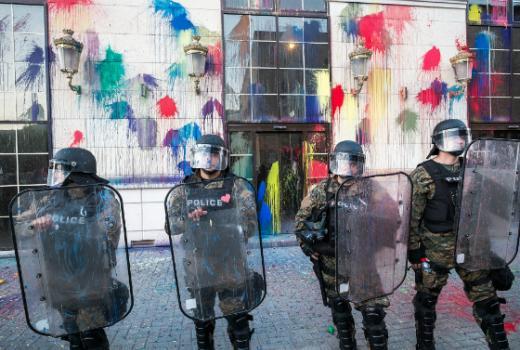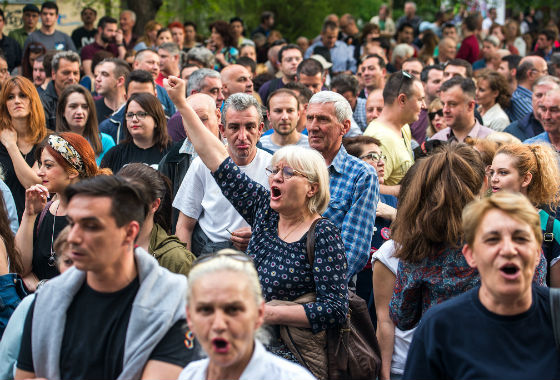Macedonia’s 'Sorosoids' and Govt Propaganda

Macedonia’s 'Sorosoids' and Govt Propaganda
29/04/2016
As the protests against the president Gjorge Ivanov, for his decision to pardon politicians, policemen, and businessmen who were under investigation by the special public prosecutor, become fiercer, the hate speech is on the rise in Macedonian media, especially in those close to the authorities.
Photo: Vanco Dzambaski
In order to show what the political crisis in Macedonia looks like, possibly the hardest one since the country's declaration of independence, it can be said that the state and the Macedonian people are divided into two – ones who support the ruling VMRO–DPMNE until their last breath and those who still have the strength to fight and to drag the leftovers of democracy into the light of day.
The capital city is divided, and so are the media, non-governmental organizations divided nad businessmen. Between them, cordons of police, armoured vehicles and water cannons. One group is demanding the return of democracy and the other, just a few hundred meters away in Skopje, is protesting in support of the ruling party.
As the protests against the president Gjorge Ivanov, for his decision to pardon politicians, policemen, and businessmen who were under investigation by the special public prosecutor, become fiercer, the hate speech is on the rise in Macedonian media, especially in those close to the authorities.
For those media, thousands of citizens who have been protesting on the streets of several towns in Macedonia for more than two weeks and demanding the resignation of Ivanov and postponement of elections, scheduled for June 5, are activists of “opposition SNSM and Soros foundation”.
Even though the protests were organized by at least a dozen non-governmental organizations, a large number of politically unbiased citizens, engineers, doctors, students, workers and unemployed citizens have joined the protest and as a gesture of revolt have been throwing balloons filled with paint on the baroque style buildings and facades of the government-lead project ‘Skopje 2014’, those same media report daily that the protesters are people paid by the Soros Foundation.
Media reports on protests are full of information exaggerating the damage and downplaying the number of protesters.
“Currently, in Macedonia, an attempt at bringing down the criminal nomenclature is underway and in the sector of journalism, it is a fight between journalism in which propaganda metastasizes and overcomes large part of media space and professional journalism. It is not about different editorial policies but about a classic misuse of journalism. The media, especially mainstream television stations on the national level, are dominated by propagandist reporting which is in line with the ruling establishment, and the media lynch against people, movements or parties is the predominant 'modus operandi'. In this situation, a common citizen is thrown into a whirl of false information and misinterpretation, which tires them and forces them to be disinterested in what is actually happening,” said Tamara Chausidis, president of Trade Union of Macedonian Journalists and Media Workers, SSNM.

Two Media Owners on the List of Pardoned
“Interior Ministry was targeted by a hooligan gang of opposition SDSM, Soros and Albanian Besa” – reported the news site Netpress after the protesters had thrown balloons with paint on the new, 20 million euro worth, baroque-style building of the Interior Ministry, during the protests on April 25.
The director of the company which owns this news site is Kosta Krpac, one of the persons saved from responsibility by president Ivanov. Under still unresolved circumstances, on April 27, Krpac, as police suspects, committed a suicide, while some of the media reported there were doubts if it was actually a murder. The death of Krpac, who was one of witnesses of the special prosecutor tasked with an investigation into a case related to the eavesdropping scandal, additionally shocked the public in Macedonia.
However, it is unknown why Krpac was on the list of people pardoned by Ivanov, since the prosecutor said there was no investigation against him in the first place.
The company FINZI – the owner of the news site Netpress and one of the loudest supporters of the ruling party - is hidden in Albany, United States of America.
The weekly Republika, which refers to protesters as „hooligans“ and „mercenaries“, is owned by a company registered at a tax haven, Irensine Limited, based in Belize.
The list of persons against whom the investigation was discontinued upon the decision of the president, also includes Vladislav Stajkovic, owner of the company NVSP, which has two media outlets in Macedonia – Radio Slobodna Makedonija and Tri Televizija, a local television in Kumanovo.
Unclear ownership structure, government ads which are being shown only in certain media and are, by the way, paid enormously, as well as the government's control over media with national concession, were among the reasons that promted journalist organizations in Macedonia to demand the elections scheduled for June 5 be postponed. The only goal was for the citizens to be realistically and fairly informed on the latest developments on the local political scene.
As things are now, and if the elections are held at the beginning of June as planned, the citizens who mostly watch television or read newspapers, will be aware only of the activities of the ruling party, and about the opposition they will be able to read only insults and bad things.
This is confirmed also by the fact that the reporting of the ruling party controlled media are negativelly framed when it comes to protests: people who participate in them and protest are being labelled, the number of participants manipulated, and all this without addressing the root of the problem and the demands of thousands who have been on the streets of Skopje and other towns for two weeks now.
„For years now there has been no media pluralism in Macedonia, the leaders of the ruling party are glorified, only one opinion can be heard, the opposition is demonized, anyone who thinks different from the official government politics is being smeared and put publicly on the wall of shame. It will be impossible to hold credible elections in Macedonia, until media reforms are not started and until an action plan is determined and then all problems facing media have to be addressed, with surgical precision“, said Zaneta Trajkoska, director of School of Journalism and Public Relations.
The Association of Journalists of Macedonia, ZNM, together with many media-related organizations, has already delivered an initiative and changes to Law on Audio and Audio-Visual Media Services to lawmakers in the assembly, as a start to comprehensive reforms of the media system.
But there is no one to read those initiatives because the assembly has already been dissolved and Macedonia, with thousands on the streets, who are dissatisfied with the regime that rules the country; is faced with a new challenge – June 5 elections, elections in which the opposition already announced they will not participate.
Still, the so-called “colourful revolution” does not plan to give up, no matter that the demands of that revolution are published and distributed by only a few media, mostly online outlets. Maybe the only hope is that the political elites will come to their senses and that someone will hear and pass on the voice of thousands of protesters and not label them as "Sorosoids" or as members of the opposition. Because at the end of the day they too are citizens of this country – Macedonia.




